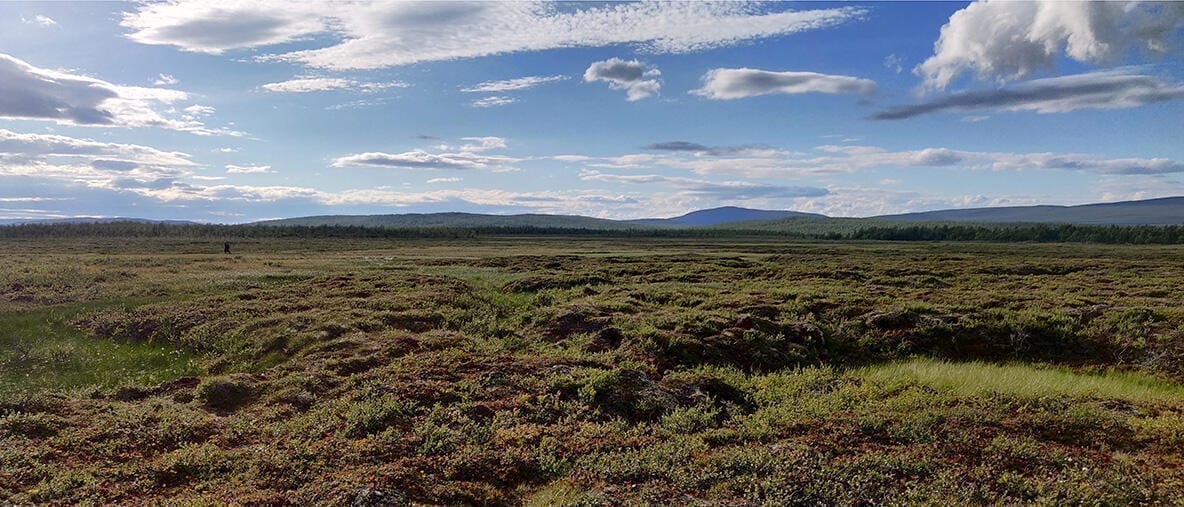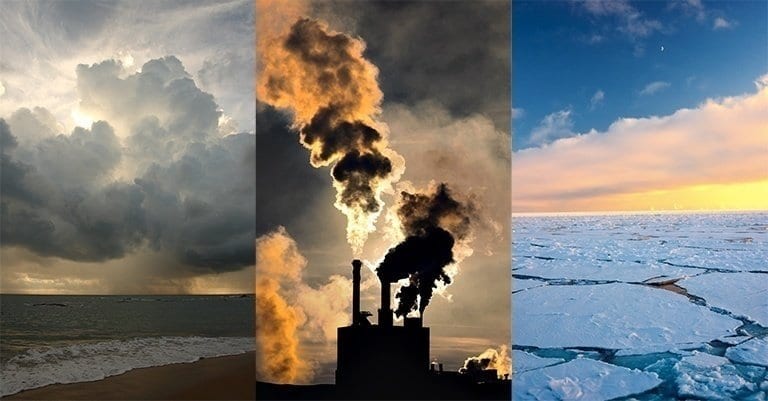
Thawing permafrost releases volatile organic compounds into the air. One of the biggest uncertainties in modelling climate change is the effect aerosols have on global warming.
When permafrost thaws due to global warming, not only the greenhouse gases known to all, but also organic compounds are released from the soil. They may have a significant impact on climate change.
Arctic peatlands are very rich in carbon. The effects of the Arctic permafrost thawing on carbon dioxide and methane emissions have been investigated and assessed extensively globally. It is known that when the permafrost thaws, carbon dioxide and methane, which accelerate climate change, are released from the soil. Less attention has been paid to the fact that thawing permafrost may also release volatile organic compounds into the air.
Researchers at the University of Helsinki observed in a study for the first time that large quantities of volatile organic compounds, including monoterpenes, sesquiterpenes and diterpenes, are released from permafrost peatland soil thawed in laboratory incubations. The peatland soil samples were collected from Finnish Lapland. The study demonstrated that global warming accelerates the release of these compounds, particularly those with lower volatility, from the Arctic permafrost.
In the Arctic region, the anthropogenic influences are weak and aboveground vegetation is scarce. The released organic compounds from thawing permafrost can be highly reactive and contribute to the formation of small particles that suspend in the air. These processes can significantly impact the complex causalities associated with climate change and, consequently, the Arctic climate as well as global warming as a whole.
Compounds released from the soil and formed in the air can, for example, increase cloud formation, making increased cloudiness reflect solar radiation away from the Earth, which curbs global warming.
“For now, it’s impossible to say with certainty whether the release of organic compounds accelerates or decelerates climate change. They introduce in any case additional uncertainties to climate change modelling” says Associate Professor Federico Bianchi from the University of Helsinki’s Institute for Atmospheric and Earth System Research (INAR).
According to Bianchi, much more research is needed to determine the significance of the findings now made. One of the biggest uncertainties in modelling climate change is precisely the effect aerosols have on global warming. Finnish researchers are at the global top in aerosol research.
Specialists of several fields at the University of Helsinki contributed to the study, which was published in the esteemed Environmental Research Letters journal.
The Latest Updates from Bing News & Google News
Go deeper with Bing News on:
Volatile organic compounds
- What consumers should know as Philips agrees to $1.1 billion CPAP settlement
Under a related deal, users who return devices by Aug. 9 can get an extra $100. As part of the recall, the company is offering repairs, replacements or refunds of the machines' cost.
- State reaches $24.5M settlement with oil company over air pollution violations
A Texas oil company has agreed to pay $24.5 million in a settlement with state regulators for excessive flaring that emitted massive pollutants posing threats to the environment and public health. The ...
- New Mexico settles nearly $25M with Texas oil and gas firm over air quality violations
It's the largest settlement the New Mexico Environment Department has reached for a civil oil and gas violation.
- You May Be Eating Your Cheese All Wrong, According to Cabot
One simple tip makes a huge difference. Cheese always makes us happy, whether snacking or whipping up a creative charcuterie board for our guests. However, we recently learned that many of us may not ...
- Remediation Forest coming to East Canfield Art Park in Detroit
The Remediation Forest, an air quality-focused, interactive art installation, is coming to the East Canfield Art Park next month.
Go deeper with Google Headlines on:
Volatile organic compounds
[google_news title=”” keyword=”volatile organic compounds” num_posts=”5″ blurb_length=”0″ show_thumb=”left”]
Go deeper with Bing News on:
Thawing permafrost
- Researcher Jean-Michel Claverie: ‘The next pandemic may come from a virus that emerged from permafrost’
The emeritus professor of genomics has managed to revive microorganisms that had been dormant for 48,500 years in the frozen soil of the Arctic ...
- Arctic permafrost now a net source of greenhouse gases, say scientists
The researchers compiled many past estimates of greenhouse gas flux in various sections of the northern permafrost region to reveal how the entire area is responding to climate change. They found that ...
- Southern birds, spiders get to Arctic along 'corridors' formed due to thawing permafrost
The experts have confirmed the "petal thawing" supposition - that is, the permafrost melting is observed right in those petal zones, 50 to 200 kilometers wide, at their southern base. The ...
- Beyond higher temperatures: Preparing for national security risks posed by climate change
When talk turns to climate change, certain images pop to mind—maybe polar bears on ever-shrinking ice floes, coral reefs drained of color, or more powerful hurricanes hitting the coast.
- Relocation of eroding Alaska Native village seen as a test case for other threatened communities
The Yup’ik village of Newtok, perched precariously on thawing permafrost at the edge of the rapidly eroding Ninglick River, is the first Alaska community to begin a full-scale relocation made ...
Go deeper with Google Headlines on:
Thawing permafrost
[google_news title=”” keyword=”thawing permafrost” num_posts=”5″ blurb_length=”0″ show_thumb=”left”]










